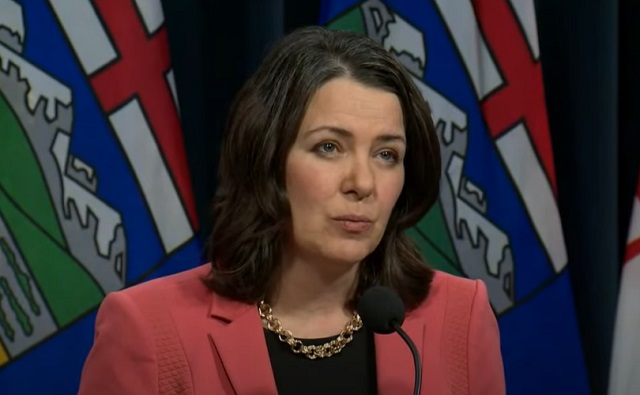Alberta
Danielle Smith blasts Trudeau gov’t as ‘lawless’ for pushing climate policies despite court rulings

From LifeSiteNews
‘We’re getting pretty frustrated, they’ve had a Supreme Court loss now that says that they cannot use their federal power as a pretext to invade provincial jurisdiction. And they’re acting like that Supreme Court case didn’t happen’
Alberta Premier Danielle Smith tore a page off Prime Minister Justin Trudeau by saying he runs a “lawless federal government” for pushing ahead with his 2035 net zero energy law, despite the fact Canada’s constitution allows provinces full jurisdiction over their natural resources.
“We’re getting pretty frustrated, they’ve had a Supreme Court loss now that says that they cannot use their federal power as a pretext to invade provincial jurisdiction,” said Smith yesterday to reporters after being asked about Trudeau’s looming new energy regulations.
“And they’re acting like that Supreme Court case didn’t happen.”
Smith then lambasted the Trudeau’s federal government for appearing to ignore another court ruling which ruled against its single-use plastics ban.
“They had another loss on the issue of plastics, which was also an unconstitutional overreach and unreasonable. And instead of accepting the court’s judgment, they’re going to drag it out again,” Smith said.
“So, we’ve got a lawless federal government. And when you have a lawless federal government, then you’ve got to assert that the Constitution matters. We’ve got the Supreme Court behind us. We’re continuing to press that matter, they haven’t dropped it yet, but I can tell you, we are, just like [Saskatchewan] Premier [Scott] Moe, are getting increasingly frustrated.”
Smith’s comments come considering two recent court rulings, the most recent being the Federal Court of Canada on November 16 overturning the Trudeau government’s ban on single-use plastic, calling it “unreasonable and unconstitutional.”
The Federal Court ruled in favor of the provinces of Alberta and Saskatchewan by stating that Trudeau’s government had overstepped its authority by classifying plastic as “toxic” as well as banning all single-use plastic items, like straws, bags, and eating utensils.
Smith celebrated the court’s decision by saying it was a big “win” yet again for Alberta.
“Like Bill C-69, the federal government’s decision to unilaterally label perfectly safe plastic consumer products as ‘toxic’ has had wide-ranging consequences for Alberta’s economic interests and has put thousands of jobs and billions of investments at risk,” Smith said after the court ruling.
The second victory for Alberta and Saskatchewan concerns a Supreme Court ruling that stated that Trudeau’s law, C-69, dubbed the “no-more pipelines” bill, is “mostly unconstitutional.” The decision returned authority over the pipelines to provincial governments, meaning oil and gas projects headed up by the provinces should be allowed to proceed without federal intrusion.
The Trudeau government, however, seems insistent on defying the recent rulings by pushing forward with its various regulations.
Smith did not take kindly to this. “Like Bill C-69, the federal government’s decision to unilaterally label perfectly safe plastic consumer products as ‘toxic’ has had wide-ranging consequences for Alberta’s economic interests and has put thousands of jobs and billions of investments at risk,” Smith said.
“It’s time for the federal government to listen to the courts and to Canadians,” she added. “We urge them to not appeal this decision, and to immediately delete ‘plastic manufactured items’ from Schedule 1 of the current Canadian Environmental Protection Act to avoid further need of legal action by Alberta and other provinces.”
Despite Smith urging them to not appeal, the Trudeau government has moved to create and back an United Nations treaty to ban “plastic pollution” by 2024.
Trudeau’s ‘Clean Electricity Regulations’ could cause power bills to skyrocket
Smith’s comments against Trudeau also come as a draft version of the federal government’s “Clean Electricity Regulations” (CER) project billions in higher costs associated with a so-called “green” power transition, especially in the resource-rich provinces of Alberta, Saskatchewan, New Brunswick, and Nova Scotia, which use natural gas and coal to fuel power plants.
Business executives in Alberta’s energy sector have also sounded the alarm over the Trudeau government’s “green” transition, saying it could lead to unreliability in the power grid.
In addition to Smith, Saskatchewan Premier Scott Moe has likewise promised to fight back against Trudeau’s new regulations, recently saying that “Trudeau’s net-zero electricity regulations are unaffordable, unrealistic and unconstitutional.”
In September, Smith announced she is preparing to use her province’s Sovereignty Act to fight the electricity regulations if the Trudeau government does not back down.
Smith earlier this week vowed that Alberta would not be phasing out oil and gas, despite the regulations proposed by Trudeau’s government.
The Trudeau government is trying to force net zero regulations on all Canadian provinces, notably on electricity generation, as early as 2035. His government has also refused to extend a carbon tax exemption on heating fuels to all provinces, allowing only Atlantic provinces this benefit.
Alberta has repeatedly promised to place the interests of their people above the Trudeau government’s “unconstitutional” demands while consistently reminding the federal government that their infrastructures and economies depend upon oil, gas, and coal.
Smith even recently tore a page off a heckler’s fantasy suggestion of a solar and wind battery-powered future after she stepped into the lion’s den to advocate for oil and gas at a conference hosted by a pro-climate change think-tank.
The Trudeau government’s current environmental goals – in lockstep with the United Nations’ “2030 Agenda for Sustainable Development” – include phasing out coal-fired power plants, reducing fertilizer usage, and curbing natural gas use over the coming decades.
The reduction and eventual elimination of the use of so-called “fossil fuels” and a transition to unreliable “green” energy has also been pushed by the World Economic Forum (WEF) – the globalist group behind the socialist “Great Reset” agenda – an organization in which Trudeau and some of his cabinet are involved.
Alberta
Red Deer Justice Centre Grand Opening: Building access to justice for Albertans

The new Red Deer Justice Centre will help Albertans resolve their legal matters faster.
Albertans deserve to have access to a fair, accessible and transparent justice system. Modernizing Alberta’s courthouse infrastructure will help make sure Alberta’s justice system runs efficiently and meets the needs of the province’s growing population.
Alberta’s government has invested $191 million to build the new Red Deer Justice Centre, increasing the number of courtrooms from eight to 12, allowing more cases to be heard at one time.
“Modern, accessible courthouses and streamlined services not only strengthen our justice
system – they build safer, stronger communities across the province. Investing in the new Red Deer Justice Centre is vital to helping our justice system operate more efficiently, and will give people in Red Deer and across central Alberta better access to justice.”

Government of Alberta and Judiciary representatives with special guests at the Red Deer Justice Centre plaque unveiling event April 22, 2025.
On March 3, all court services in Red Deer began operating out of the new justice centre. The new justice centre has 12 courtrooms fully built and equipped with video-conference equipment to allow witnesses to attend remotely if they cannot travel, and vulnerable witnesses to testify from outside the courtroom.
The new justice centre also has spaces for people taking alternative approaches to the traditional courtroom trial process, with the three new suites for judicial dispute resolution services, a specific suite for other dispute resolution services, such as family mediation and civil mediation, and a new Indigenous courtroom with dedicated venting for smudging purposes.
“We are very excited about this new courthouse for central Alberta. Investing in the places where people seek justice shows respect for the rights of all Albertans. The Red Deer Justice Centre fills a significant infrastructure need for this rapidly growing part of the province. It is also an important symbol of the rule of law, meaning that none of us are above the law, and there is an independent judiciary to decide disputes. This is essential for a healthy functioning democracy.”
“Public safety and access to justice go hand in hand. With this investment in the new Red Deer Justice Centre, Alberta’s government is ensuring that communities are safer, legal matters are resolved more efficiently and all Albertans get the support they need.”
“This state-of-the-art facility will serve the people of Red Deer and surrounding communities for generations. Our team at Infrastructure is incredibly proud of the work done to plan, design and build this project. I want to thank everyone, at all levels, who helped make this project a reality.”
Budget 2025 is meeting the challenge faced by Alberta with continued investments in education and health, lower taxes for families and a focus on the economy.

Quick facts
- The new Red Deer Justice Centre is 312,000 sq ft (29,000 m2). (The old courthouse is 98,780 sq ft (9,177 m2)).
- The approved project funding for the Red Deer Justice Centre is about $191 million.
Alberta
Made in Alberta! Province makes it easier to support local products with Buy Local program

Show your Alberta side. Buy Local. |
When the going gets tough, Albertans stick together. That’s why Alberta’s government is launching a new campaign to benefit hard-working Albertans.
Global uncertainty is threatening the livelihoods of hard-working Alberta farmers, ranchers, processors and their families. The ‘Buy Local’ campaign, recently launched by Alberta’s government, encourages consumers to eat, drink and buy local to show our unified support for the province’s agriculture and food industry.
The government’s ‘Buy Local’ campaign encourages consumers to buy products from Alberta’s hard-working farmers, ranchers and food processors that produce safe, nutritious food for Albertans, Canadians and the world.
“It’s time to let these hard-working Albertans know we have their back. Now, more than ever, we need to shop local and buy made-in-Alberta products. The next time you are grocery shopping or go out for dinner or a drink with your friends or family, support local to demonstrate your Alberta pride. We are pleased tariffs don’t impact the ag industry right now and will keep advocating for our ag industry.”
Alberta’s government supports consumer choice. We are providing tools to help folks easily identify Alberta- and Canadian-made foods and products. Choosing local products keeps Albertans’ hard-earned dollars in our province. Whether it is farm-fresh vegetables, potatoes, honey, craft beer, frozen food or our world-renowned beef, Alberta has an abundance of fresh foods produced right on our doorstep.
Quick facts
- This summer, Albertans can support local at more than 150 farmers’ markets across the province and meet the folks who make, bake and grow our food.
- In March 2023, the Alberta government launched the ‘Made in Alberta’ voluntary food and beverage labelling program to support local agriculture and food sectors.
- Through direct connections with processors, the program has created the momentum to continue expanding consumer awareness about the ‘Made in Alberta’ label to help shoppers quickly identify foods and beverages produced in our province.
- Made in Alberta product catalogue website
Related information
-

 Business2 days ago
Business2 days agoIs Government Inflation Reporting Accurate?
-

 2025 Federal Election2 days ago
2025 Federal Election2 days agoCarney’s Hidden Climate Finance Agenda
-

 2025 Federal Election2 days ago
2025 Federal Election2 days agoStudy links B.C.’s drug policies to more overdoses, but researchers urge caution
-

 2025 Federal Election2 days ago
2025 Federal Election2 days agoWhen it comes to pipelines, Carney’s words flow both ways
-

 2025 Federal Election2 days ago
2025 Federal Election2 days agoPolls say Canadians will give Trump what he wants, a Carney victory.
-

 2025 Federal Election1 day ago
2025 Federal Election1 day agoCarney Liberals pledge to follow ‘gender-based goals analysis’ in all government policy
-

 2025 Federal Election1 day ago
2025 Federal Election1 day agoPoilievre’s Conservatives promise to repeal policy allowing male criminals in female jails
-

 Also Interesting2 days ago
Also Interesting2 days agoIf You Frequently Travel, A Second Phone Number Can Be A Cost Effective Solution





